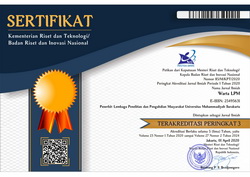Peningkatan Keterampilan Merancang Konten Pembelajaran dan Evaluasi Formatif Menggunakan Pendekatan Permainan
DOI:
https://doi.org/10.23917/warta.v26i1.1097Keywords:
learning content, evaluation, formative, game based evaluation, kahootAbstract
Designing learning content and its evaluation is very necessary in teaching and learning activities to determine the extent to which results have achieved and its effectiveness. However, the evaluationa are sometimes still use traditional methods which might actually make students worry about the final result. In fact, this concern should be avoided in order to obtain maximum results. One strategy is to use a game approach, an evaluation model to measure abilities by utilizing games. The purpose of this activity is to improve partners' ability to design learning content and its evaluation, especially formative evaluation, using a game settings. The tools used for evaluation is Kahoot!, a web-based and mobile game platform that can be filled in online questions. The partners involved in this activity were teachers from various subjects of SMK Muhammadiyah 1 Klaten Tengah (6 people), SMK Muhammadiyah 3 Klaten tengah (9 people), and SMK Muhammadiyah 4 Klaten Tengah (6 people) for a total of 21. The method applied in this activity consists of 4 stages, start from analysis, formulation, solutive action, and evaluation. Solutive action is realized in the form of a workshop which is divided into two sessions, namely a theoretical session and a practical session. Based on the evaluation carried out between before and after the activity, it was found that the participants knew better how to design learning content in the form of videos using existing software. In addition, participants also know how to create formative evaluation tools using a game approach with the Kahoot! platform. Thus it can be concluded that the knowledge and skills of the participants became better after the activity.
Downloads
References
Alfiaturrohmaniah, F., Masfuah, S., & Roysa, M. (2022). Dampak Pembelajaran Daring Terhadap Hasil Belajar Siswa Sekolah Dasar. WASIS: Jurnal Ilmiah Pendidikan, 3(1), 53–59.
Aprilianto, A., & Sukaswanto, S. (2018). PENGEMBANGAN ALAT EVALUASI BERBASIS PERMAINAN TEKA-TEKI SILANG PADA MATA PELAJARAN CHASSIS OTOMOTIF DI SMK MUHAMMADIYAH 1 MOYUDAN. E-Jurnal Pendidikan Teknik Otomotif-S1, 21(2).
Basilaia, G., & Kvavadze, D. (2020). Transition to online education in schools during a SARS-CoV-2 coronavirus (COVID-19) pandemic in Georgia. Pedagogical Research, 5(4), 1–9.
Damayanti, N. A., & Dewi, R. M. (2021). Pengembangan Aplikasi Kahoot Sebagai Media Evaluasi Hasil Belajar Siswa. Edukatif: Jurnal Ilmu Pendidikan, 3(4), 1647–1659.
Daryanes, F., & Ririen, D. (2020). Efektivitas penggunaan aplikasi kahoot sebagai alat evaluasi pada mahasiswa. Journal of Natural Science and Integration, 3(2), 172–186.
Dewi, W. A. F. (2020). Dampak Covid-19 terhadap implementasi pembelajaran daring di Sekolah Dasar. Edukatif: Jurnal Ilmu Pendidikan, 2(1), 55–61.
Diana, N., Latifah, S., Yuberti, Komikesari, H., Rohman, M. H., & Tiyan, Lady. (2021). Developing an e-learning-based critical-thinking assessment as a physics learning evaluation media with Kahoot! interactive quiz. Journal of Physics: Conference Series, 1796(1), 12055. https://doi.org/10.1088/1742-6596/1796/1/012055
Herliandry, L. D., Nurhasanah, N., Suban, M. E., & Kuswanto, H. (2020). Pembelajaran Pada Masa Pandemi Covid-19. JTP-Jurnal Teknologi Pendidikan, 22(1), 65–70.
Ishartono, N., Nurcahyo, A., Sufahani, S. F., & Afiyah, A. N. (2022). Employing PowerPoint in the Flipped-Learning-Based Classroom to Increase Students’ Understanding: Does It Help? Asian Journal of University Education, 18(3), 649–662. https://doi.org/10.24191/ajue.v18i3.18952
Khanittanuphong, P., Iamthanaporn, K., & Bvonpanttarananon, J. (2022). The impact of the transition from flipped classroom to online lectures on learning outcomes and student satisfaction in a rehabilitation medicine clerkship during the COVID-19 pandemic. BMC Medical Education, 22(1), 885. https://doi.org/10.1186/s12909-022-03959-7
Mardati, A., Sukma, H. H., & Saifudin, M. F. (2022). Integrasi Kemampuan TPACK untuk Penguatan Kompetensi Pedagogi Guru SD Muhammadiyah se-Kecamatan Moyudan Sleman. Warta LPM, 25(1 SE-Articles), 33–43. https://doi.org/10.23917/warta.v25i1.595
Pramudita, B. A., Aprillia, B. S., Pangaribuan, P., Ramdhani, M., & Adam, K. B. (2022). Online Learning Content Creation for Junior High School Teachers during the Covid-19 Pandemic. Warta LPM, 25(1 SE-Articles), 10–20. https://doi.org/10.23917/warta.v25i1.593
Santoso, J. T. B., & Widiyanti, A. (2022). Kahoot! Sebagai Inovasi Evaluasi Hasil Belajar Siswa Yang Efektif Dan Menyenangkan. JINoP (Jurnal Inovasi Pembelajaran), 8(2).
Sukirman, S., Sarwahdi, S., & Handika, A. S. (2022). PENINGKATAN KETERAMPILAN GURU DALAM MENGOPERASIKAN ZOOM MEETING DAN MENGELOLA GOOGLE FORM UNTUK MENDUKUNG PROSES DAN EVALUASI BELAJAR DARI RUMAH (BDR). WIDYA LAKSANA, 11(1), 1–14.
Syaparuddin, S., & Elihami, E. (2020). PENINGKATAN MOTIVASI BELAJAR SISWA MELALUI VIDEO PADA PEMBELAJARAN PKn DI SEKOLAH PAKET C. JURNAL EDUKASI NONFORMAL, 1(1), 187–200.
Wang, H., & Chen, C. W. (2020). Learning English from YouTubers: English L2 learners? self-regulated language learning on YouTube. Innovation in Language Learning and Teaching, 14(4), 333–346.
Yábar, S. V. V., & Guillén, M. E. del C. F. (2022). Formative Evaluation in a Context of Pedagogical Renewal: Practices at the Service of Success. Journal of Higher Education Theory and Practice, 22(8). https://doi.org/10.33423/jhetp.v22i8.5334
Zahir, A., Nur, H., Jusrianto, J., Hidayat, W., & Parubang, D. (2021). Evaluasi Hasil Belajar Elektronika Digital melalui Tes Formatif, Sumatif, dan Remedial. Jurnal Literasi Digital, 1(2), 122–129. https://literasidigital.my.id/literasi/article/view/13
Zamzaili, Z., & Swita, B. (2021). Evaluasi Formatif Berbantuan Komputer Untuk Meningkatkan Kemampuan Analisis Butir Soal Mahasiswa FKIP Universitas Bengkulu. Jurnal Pendidikan Matematika Raflesia, 6(1), 60–69. https://doi.org/10.33369/jpmr.v6i1.14428
Downloads
Submitted
Accepted
Published
How to Cite
Issue
Section
License
Copyright (c) 2023 Warta LPM

This work is licensed under a Creative Commons Attribution 4.0 International License.















